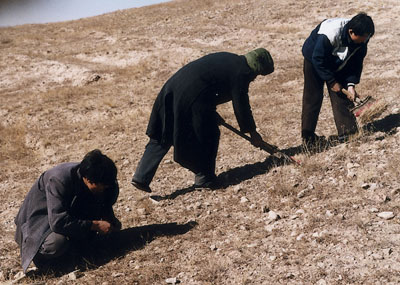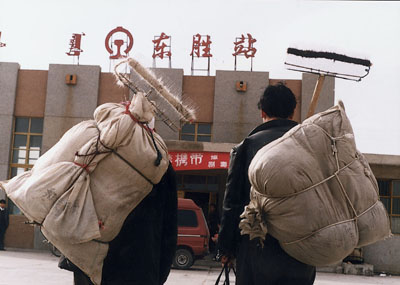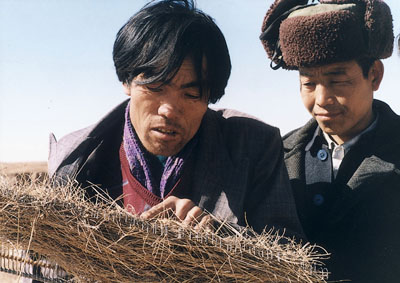|

Chinese peasants from neighboring
provinces digging hair-
weeds in Inner Mongolia's already weakened
grassland
[Southern Mongolia
Watch, New York City, April 21, 2003 ] According to the Chinese
official news, Xin-Hua News, large groups of Chinese peasants
from the neighboring province of Ning Xia have poured into
western Inner Mongolia’s Alashaa Left Banner grasslands to dig
hair weeds, resulting in severe damage to the already weakened
fragile grassland ecosystem.
Hair weed, also
known as ‘earth hair’ or ‘hair grass’, is a wild terrestrial
algae widely used in Chinese cuisine and considered a ‘good
luck’ plant by the Chinese because its name is a homophone with
the word “fa-cai” meaning “getting rich”. The market price of
hair weed is very high in China and among the Chinese
communities outside China. As the largest natural hair weed
growing area in
China, Alashaa Left
Banner has since the 1980s been frequently trespassed by Chinese
peasants pouring in from the neighboring provinces Ning Xia and
Gan Su. Xin-Hua News admitted that the Chinese peasants’ illegal
and irrational activities have caused serious ecological damages
to the areas where the native Mongols are currently banned from
practicing their traditional animal husbandry lifestyle, a
lifestyle which had maintained a perfect balance between human
activities and the natural environment for thousands of years.

Every year 200,000 (person time) Chinese
peasants pour
into Inner Mongolia to destroy 15 million
hectare
grassland with their sharp harrows

Selecting hair-weed which is sold in very
high price among
the Chinese because of its homonymous name
with
the Chinese word "fa cai" --- "getting
rich".

Kids of Ning Xia Province are encouraged
to stop schooling
by their parents for the "hair-weed rush"
to Inner
Mongolia. In this picture, kids are en
route
to Inner Mongolia for hair weeds.
|





